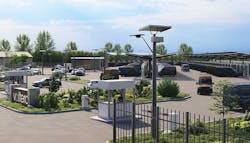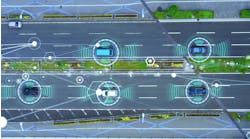With Voltera, EdgeConneX Brings Powered Real Estate to EV Charging
Last year data center developer EdgeConneX quietly began working with customers on creating charging stations for fleets of electric vehicles (EVs), seeing an alignment between the power and data requirements for next-generation vehicles.
Today that initiative launches as Voltera, a spinoff from EdgeConneX with a multibillion-dollar plan for a network of strategically located charging facilities to enable EV deployment at scale. The company arrives with equity backing from EQT Infrastructure, the giant Swedish infrastructure fund that owns EdgeConneX, along with a leadership team with deep experience in the EV sector.
The team is led by CEO Matt Horton, who was previously Executive Vice President of Energy & Charging Solutions at electric truck maker Rivian and Chief Commercial Officer at Proterra, which manufactures powertrains for EV vehicles.
The sweet spot for Voltera will be the pending deployment of EV fleets by large customers looking to transition their delivery and supply chains to sustainable models.
“Charging infrastructure is one of the most critical requirements for EV deployment at scale,” said Horton. “As companies take initial delivery on large EV orders, they’re finding that the charging infrastructure does not exist at the scale needed to support those, or future, deployments. A key part of the challenge is that charging facilities need to be strategically located and require vast amounts of power. Voltera is uniquely positioned to help solve those challenges.”
Data Meets Transportation
EdgeConneX has a strong track record of deploying multi-megawatt data centers at scale and speed. It was an early player in edge computing, building data centers at key network “pain points” to improve performance. The company’s streamlined construction methodology allowed it to deploy 25 data centers in its first two years in the sector, and expand into hyperscale data centers of up to 100 megawatts.
Along the way, EdgeConneX has been an active participant in the growing intersection between the data center and energy industries. That trend takes on greater importance as transportation is transformed by both digitization and electrification.
“As a pioneer in the digital infrastructure industry, EdgeConneX has solved many of the same challenges EV fleet operators and automakers face – acquiring, permitting, powering and operating sites in strategic locations, while ensuring customers’ speed to market,” says EdgeConneX CEO Randy Brouckman. “It’s a highly logical and practical application of our long-developed data center innovations to solve another very real and significant challenge. Voltera will advance the transportation industry like EdgeConneX did digital infrastructure.”
The EdgeConneX foray into EV charging began with a proof-of-concept facility in Phoenix, which reinforced the connection between the industries.
“What we found is that there was a data offload opportunity,” said Phillip Marangella, Chief Marketing Officer for EdgeConneX. “We can put in a whole bank of EV chargers, and the vehicles can come in offload their data, and it’s right there at the data center.”
It’s an application of “data is the new oil,” serving as the connective tissue for networks of vehicles that are much like data centers on wheels.
“Electric vehicles are quite different from your traditional combustion engines in that the amount of data that comes off of them is staggering,” said Horton. “Couple that with the fact that many companies in the autonomous vehicle space are using advanced telemetry systems that generate tremendous amounts of data. The ability to capture, analyze and understand that data and use it for product development is critical for every company in the EV market. This market has very different requirements and needs than a traditional diesel truck fleet.”
Megawatts of Power at Charging Depots
As a turnkey solution provider, Voltera will provide “EV charging facilities as a service,” handling site identification and acquisition, power procurement, facility design and construction, charging hardware deployment, operations and maintenance.
Voltera CEO Matt Horton. (Photo: Voltera)
“We have already acquired a number of properties and have dozens of sites under development that we’re working on,” said Horton. “We plan to expand to meet the scale of the opportunity, and we see a wholesale transformation of the vehicle base in the next 15 years or so. We are planning to have hundreds and hundreds of locations across North America today and into other geographies in the future.”
Voltera says its strategy will be both customer-driven (in a particular location for a particular customer) and thesis-driven (proactive development in the strategic locations customers will need to be), a combination it hopes can speed time to market and enable customers to meet their deployment timetables.
“We’re seeing a lot of demand in the 5 to 10-megawatt range of power requirements,” said Horton. “We are certainly not shy about tackling projects that are much larger than that in terms of the power required.
“The site types are going to be varied,” he said. ” We are serving a range of companies in the EV market, including everything from ride sharing fleets to trucking and local deliveries, and each of their needs will be different. You will see dense urban areas where we will show up in parking garages. In ports and other commercial warehouse zones we’ll have larger, more open facilities for trucks. You will also see us in places like airports and rental car facilities.”
Voltera will have a core facility design, but be flexible enough to customize charging depots for large customers. This enables a flexible business model similar to the data center industry, including both multi-tenant colocation-style facilities as well as dedicated built-to-suit facilities for large customers.
“Some customers will have needs for non-charging related assets at the site.” said Horton. “It might be break rooms for their staff, it might be a small data center on-site to handle their data needs, vehicle maintenance and other solutions. We want to be the partner that can provide all of that to them. It starts with making sure that we’ve got sufficient power at the site to deliver everything that they need.”
Investment Drives Scale: The EQT Factor
EQT is an infrastructure fund based in Sweden with more than 77 billion Euro ($78.4 billion U.S.) in assets under management across 36 funds. That type of scale can move the needle on new investments.
“EQT Infrastructure aims to help support the global energy transition, and was looking for opportunities to help develop the EV charging infrastructure necessary to support vehicle electrification at scale,” said EQT Partner Jan Vesely. “Through our work with EdgeConneX, we understand that the capabilities needed to deliver critical infrastructure for transport electrification at scale are similar to the capabilities EdgeConneX developed as a leading data center provider.
“In Voltera, EQT sees an opportunity to partner with a company that can drive positive change, helping reduce greenhouse gas emissions by developing EV infrastructure, and we are excited to back their expansive ambitions,” Vesely said.
Horton said EQT’s commitment signals a “significant shift” in the EV market. “The market is past the pilot phase,” Horton says. “The time is right to scale, and the market is hungry for new business models and creative market-driven solutions to address the power infrastructure challenges that have to date limited EV deployment at scale.
“I think this is really strong validation that the market for electric vehicle infrastructure is going to be a significant growth industry well into the future,” he continued. “Having a partner in EQT that takes a long-term view of industrial transformations like this is exciting, and being able to work with them to deploy a multibillion-dollar capital campaign is going to be transformative for our company and for the industry as well.”
Voltera team members have experience from companies such as Greenlots (now Shell Recharge Solutions), Rivian, Electrify America, EVgo, Proterra, Arrival, and Ford Mobility, in addition to EdgeConneX.
An Evolving Landscape for EV Charging Networks
There are currently about 50,000 EV charging stations in the U.S., according to the U.S Department of Energy, compared to about 150,000 gas stations. Current players include public companies like ChargePoint and EVGo and networks affiliated with automakers like the Tesla Supercharger Network and Electrify America (Volkswagen America).
As companies transition to EV fleets, that balance of EV networks to gas stations will need to shift quickly, a process that will likely be accelerated by corporate ESG mandates and deadlines.
“It’s really exciting now that fleets and other businesses are dramatically looking to scale up their deployment of EVs,” said Horton. “That level of scale requires completely different power solutions than we’ve had in the past.”
Voltera is focused on early engagement with customers and partners.
“An important element of our business approach is to anticipate what the customer needs and where they’re going to need to be in the future, so that we can we can start the heavy lifting on acquiring sites and power well in advance,” said Horton. “In the EV world today, if you haven’t already figured out your infrastructure strategy by the time you order an electric vehicle, it’s too late. These projects at scale can take 18 to 24 months typically. We’re working closely with our customers to understand their future roadmaps, so that we can be deploying our capital and acquiring the best real estate for them well in advance of their appointment.
“We have a strong interest in providing the cleanest, most cost-effective electricity to our end customers. and we are through some relationships we have we are exploring renewables procurement for all of our locations,” Horton added. “Moving vehicles off of fossil fuels is an important step one. Step two for us is ensuring that we’re able to source the cleanest power possible for those vehicles.”






